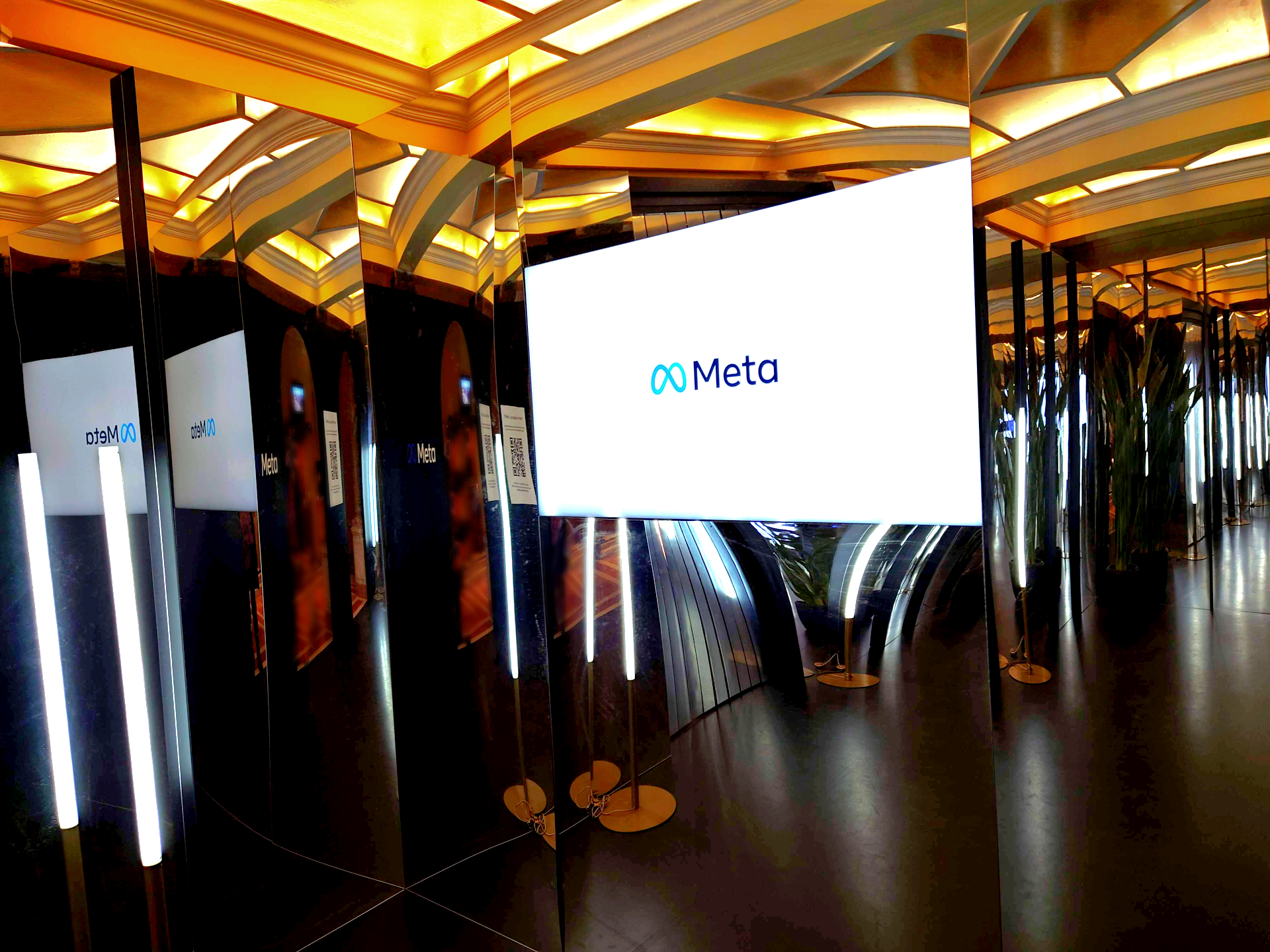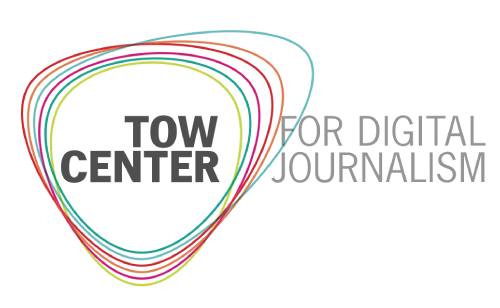This article was featured in the Tow Center for Digital Journalism’s weekly newsletter. Subscribe here to stay up to date on our latest events and publications.
The debate around the influence of Google and Meta on the news industry was front and center at Europe’s major journalism conference earlier this month, with the involvement of technology platforms in everything from direct news media funding and online harassment through to the war in Ukraine dominating many discussions.
Hundreds of people from around the globe gathered in Perugia, Italy, on Wednesday, April 5, for the annual International Journalism Festival, which had been paused the past two years for covid-19. Wearing mandatory KN95 masks and lanyards adorned with both the festival’s hashtag and the Google News Initiative logo, journalists, researchers, and other professionals roamed from panel to panel, set in mid-thirteenth-century churches and gothic public palaces, on topics ranging from AI’s role in journalism to best practices on covering the climate crisis. One of the most notable themes for the Tow Center, though, was the lively conversations around platforms and publishers taking place at a journalism festival partially funded by the platforms themselves.
Emily Bell, the Tow Center’s founder and director, spoke on a number of panels throughout the week. Bell, who has overseen half a decade’s worth of Tow research on the relationship between platforms and publishers, largely discussed issues like the implications of Meta (formerly Facebook) and Google being the largest global funders of journalism and whether media organizations should accept funding from platforms at all. She also joined Julie Posetti, director of research at the International Center for Journalists, to parse the results of a survey conducted with Tow on the pandemic’s continued global impact on journalism. (A second study is currently underway; media workers can take the survey online.)
Patrícia Campos Mello, Tow fellow and reporter at large at the Folha de São Paulo newspaper, also sat on panels that week dedicated to online violence against women and, even more specifically, to being persistently targeted by President Jair Bolsonaro’s “hate cabinet.”
Google, Meta, and the Open Society Foundations were the main sponsors for the free, five-day festival, complete with a charitable donation from Craig Newmark Philanthropies (Tow receives funding from both OSF and Craig Newmark Philanthropies). Within the festival’s de facto headquarters at the Hotel Brufani, in the hallway leading to the information desk, was a mirror-lined entrance to the Meta Journalism Project’s exclusive bar, with at least one employee guarding the door at all times. (When I asked if I could go inside, I was told no, unless I was on “the list,” but I could take a picture with their logo outside and tag them on social media instead. I did not.)
Midday Thursday, journalists from France, Germany, the United States, and Switzerland convened to discuss the state of play on platforms and publishers. Ingo Dachwitz, Netzpolitik reporter and coauthor of “Google, the media patron,” began the panel by thanking both the IJF and its sponsors—namely Google and Meta—for making space to discuss this “complex relationship” that has “prompted questions about the independence and autonomy of journalism in the digital age.”
In the US, Bell described 2021 as a boom year for the big news publishers alongside a local news ecosystem that continues to struggle. (Tow research has shown that more than 6,150 news workers were laid off and at least 86 outlets permanently closed in the first eighteen months of the pandemic.) Yet the US journalism industry, particularly at the local level, has little appetite for adopting legislation resembling Australia’s News Media Bargaining Code, according to Bell, which would allow publishers to negotiate directly with the platforms for use of their content and has served as a template for countries like Canada.
“Maybe the fact that local newsrooms are not particularly for legislative reform may be a reflection of American culture wanting to see fixes come from within the industry and the free market,” Bell said. “Or it could be that—if you cynically want to say—this is lobbying money, and it was lobbying money well spent.” This absence of government policy has been filled by Google and Meta themselves, according to Bell, and their answer for newsrooms is to equip them with the capacity to raise their own money, primarily through subscriptions.
In Switzerland, major news companies have paused their cooperation with Google entirely, according to Adrienne Fichter, Republik’s investigative tech reporter. This is a complete reversal from years prior, stretching back to 2018, when Swiss media were some of the largest recipients of support from Google’s Digital News Initiative, which later became the Google News Initiative. It comes amid the push to pass an ancillary copyright law for the Swiss press that was first enacted by Germany and later adopted by the European Parliament, and in theory allows publishers to collect a fee from platforms each time they link to their digital content.
Relatedly in France, Gilles Bruno, editor of L’Observatoire des Médias, says that the government has now fined Google half a billion euros for refusing to negotiate using fair terms with the alliance de la presse d’information générale, or the general press, under the pan-EU ancillary copyright law.
And in Germany, Dachwitz says, the market authorities are now investigating Google News Showcase, an aggregation platform that, according to PressGazette, pays publishers to participate by “maintaining short, low-maintenance newsfeeds, or panels, on the platform.” The investigation came after they discovered a clause in Google’s contracts with publishers that forbade them from taking money from any other licensing deal—including fees collected through ancillary copyright.
Google hosted just a single panel on new tools and techniques for journalists, once in Italian and then again in English, whereas Meta sponsored at least five panels on topics ranging from storytelling tools and products for the Metaverse to fact-checking during challenging times—like covid-19 or Russia’s invasion of Ukraine.
While Meta and Google continue to invest in fact-checking and content moderation on their platforms around the world, many panelists discussed the limitations, and subsequent real-life consequences, of what are often inadequate policies. In “Covering Putin’s War,” panelist Jane Lytvynenko, a senior research fellow at the Shorenstein Center’s Technology and Social Change project, discussed the inequality ingrained in tech platforms’ moderation that disproportionately takes place in English-speaking, Western countries. The lack of language specialization, including languages currently being used in the war in Ukraine, Lytvynenko says, “means propaganda works better in some parts of the world than others.” In a separate panel later in the week, on journalists covering tech, Coda Story cofounder and editor in chief Natalia Antelava cited the deadly impact Meta policies have had in countries like the Philippines (Facebook-owned Instagram is the platform of choice for Tagalog-speaking human traffickers), Ethiopia (misinformation and hate speech circulated on Facebook inflamed ethnic violence amid a civil war), and Ukraine (Russia-backed disinformation networks have been pushing coordinated fake news on Facebook about Russia’s invasion of Ukraine), to name just a few examples.
How, if at all, platforms will approach their responsibility to the public and a free press during a full-scale war in Ukraine was also discussed. Peter Pomerantsev, research fellow at the Agora Institute, said in “Covering Putin’s War” that for him, this specific moment is when tech platforms need to take a stance and equip Ukrainians and the Russian people with the appropriate tools and services during wartime. “It’s not taking a geopolitical stance, it’s taking a stance around the things they claim to value, which is human rights, access to information, and connecting people,” argued Pomerantsev. Bell, in the “State of Play” discussion, similarly argued that, “if the platforms are really earnest in their endeavors, they now need to align their practices on the ground and their content moderation policies with supporting a free press, which at the moment they absolutely do not.”
The formal platforms-and-publishers discussions in Perugia wound down with a conversation on whether newsrooms should accept funding from Google and Meta—a topic dividing the industry globally—moderated by Mathew Ingram, the Columbia Journalism Review’s chief digital writer. Charlie Beckett, founding director of Polis at the London School of Economics, said their JournalismAI project has received a million euros over the past four years from Google. Beckett defended this partnership because the London School of Economics decided the funding would go to Polis, the independent think tank, rather than directly to his department, acting as a safeguard of sorts for “the principles of academic freedom and integrity.” The director of the European Journalism Centre, Lars Boering, said that his nonprofit also has a partnership with the GNI and has so far received $450,000 in funding for various initiatives, including a paid summer fellowship program for thirty students looking to “drive innovation across the news industry.”
Conversely, Bell said that the Tow Center has received zero funding from either tech platform, and she’s not alone. During the other panel on covering the tech beat, Julia Angwin, cofounder and editor at large of The Markup, says that they’ve neither received nor sought out money from Google or Facebook. “Our motto is Big Tech is watching you, and we’re watching Big Tech,” said Angwin. “It just would destroy trust with our readers, I think, if we were like, ‘Brought to you by Google News.’” And, in the same panel, Coda Story’s Antelava said funding decisions are simple for them: “We don’t take money from governments, we don’t take money from Big Tech, and we don’t take money from oligarchs, which explains why we are so poor.”
One notable point of agreement was that the people working for the Google News Initiative and Meta Journalism Project seem to genuinely care about journalism, and the funding often leads to innovative projects that otherwise wouldn’t exist. In the end, though, that may not be enough if these news initiatives sit within the tech companies whose policies and actions often run counter to the principles of free speech and press freedom.




